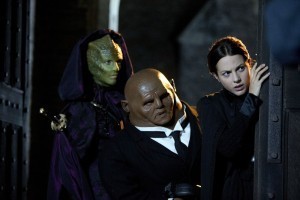Jennifer Crusie's Blog, page 284
November 24, 2013
Who Sunday: The Snowmen, Steven Moffat
I love this episode. It’s so good even Clara doesn’t annoy me. Yes, she’s Oswin from Asylum of the Daleks, and there’s a reason she keeps coming back from the dead, but it’s a dumb reason so forget about that and just enjoy a nice British Christmas story with murderous snowmen and the Great Intelligence who will steal your brain when you’re a child and then dump you when the Doctor shows up (see also “The Bells of St. John”). Try to concentrate on that marvelous staircase in the sky; that’s lovely. Also Strax. Strax is like gravy at Christmas dinner: there’s never enough.

November 23, 2013
Cherry Saturday: 11 23 2013
Today is National Cashew Day. Put some hot fudge and ice cream under a cashew and go for it.

November 19, 2013
Killing Characters, aka Please Don’t Kill Carter
The producers (Jonah Nolan and Greg Plageman) of one of my favorite shows, Person of Interest, have announce not-so-cryptically that Somebody’s Gonna Die, or as they put it, “We promised our actors and our audience that these characters wouldn’t be static, stuck in an endless loop — that they would have a journey. And, of course, every journey comes to an end.” I am not happy. I love all of the characters on this show including the dog, especially the dog, and I’m not prepared to let go of any of them, so as a viewer, I’m apprehensive. I am not going so far as to say, “If they kill X, I’ll never watch again,” because this is a stellar show, but I also don’t want to mourn a character I love. I’ve been doing that too much lately in real life, I need TV as an escape, not a reminder that people I care about die. So as a viewer I’m against this.
But as a writer, I see their point.
If you don’t change your story after a stretch of time (an act in a novel, a season in a series), readers get story fatigue. “We’ve been doing this forever,” they say. “Bored now.” Case in point: The Mentalist, a show that’s been fun because of the characters but that’s been running on plot fumes for awhile now because Patrick Jane has been looking for serial killer Red John for six freaking years. Now that he’s finally got Red John (whoever he is; my money’s still on Brett Stiles) on the run, it’s picking up again, but dear God, they’re even dragging that out. When you stretch things out that far, the story gets thin.
So you have a couple of options. You can keep your story as it is but keep it short. Life on Mars is the gold standard here; they knew their premise wouldn’t stretch past sixteen episodes, so even though it was a huge hit and the BBC offered them another year, they ended it, going out strong and creating a classic that still stands up seven years later and I’m betting will still be amazing twenty years from now. But if you want to go for the long form, you’re going to have to put in turning points, things that spin the story around in a new direction, make it all new. Person of Interest has been brilliant at this, essentially remaking the story each season, but now they’re flirting with death.
Killing an important character is a great way to turn a story around; you’re pulling out an integral piece of the structure, and all the other characters have to redefine themselves without that piece, adapt to the changes that the death brings. Joss Whedon killed Tara on Buffy the Vampire Slayer, sending Tara’s lover Willow into a murderous rampage, creating crises for the other characters who loved Willow but had to stop her ending the world, spurring Xander to sacrifice and maturity, and bringing back Giles (still one of the greatest sit-up-and-say-OH-MY-GOD moments in TV) to repair the fractured family. Compare this to the death of Wash on Firefly/Serenity, a death that had no real impact on the plot, its impact on the characters summed up as “We’re all really unhappy now.” Wash was a great character, but his death was meaningless from a story-telling perspective.
I think that’s the key to killing a loved character: it has to have meaning. Whedon, a serial loved-character killer, did it again in The Avengers when he killed Phil Coulson (I have the “Keep Calm, Coulson Lives” T-shirt), but he gave Coulson death-with-meaning, his death unified the otherwise contentious superheroes into The Avengers, who then worked together to save the world and not incidentally to kick Loki’s murderous ass. Coulson’s death transformed the story, so the story earned it. I’m thinking of Saving Private Ryan‘s “Earn this,” something every important doomed character should say to his or her writer: “If you’re going to kill me, earn it, make it mean something.”
Which brings me back to Person of Interest. They’ve been so gutsy up to now about spinning their story, taking a premise they could probably have milked for at least another year and turning it by unleashing the mad Root on the plot who not-so-insanely points out that The Machine is in the hands of ruthless killers and they have to set it (“her”) free. That led to the second season, a conflict between Our Gang and the shadowy government branch The Machine also talked to, ending with The Machine setting itself free, which lead to the current great third season, the Machine talking to Our Gang, the government, and Root, spooling out multiple instructions in complex layered stories that boggle a story-teller’s mind. These writers know how to plot. Which is why they probably really are going to kill a vital character tonight or next week, the bastards.
And this is where Viewer and Story Wonk collide. I don’t want to lose anybody in that show. I love them all, even the insane Root, a role Amy Acker is pretty much having for breakfast, even if Harold does have her imprisoned in the library at the moment. The character they’ve been teasing as doomed is Fusco, the formerly corrupt cop, now redeemed and part of the team, the everyman in a team of super-skilled human beings. When your cast is a computer genius/billionaire, a superspy with extraordinary combat skills, a brilliant former-military cop who’s also a loving single mother, a fixer with connections all over the city who’s also the occasional lover of the superspy, the female version of the superspy with an even lower emotional affect, a batshit computer genius with no moral compass, and one great dog, there’s really nobody in there who steps up and says, “You know, I’m kinda boring. Off me.”
And yet one of them really does have to go. That cast is just too damn big; at this point, there are more people working for Harold than are working for the government (and I’m not even counting Elias, the mob boss, although I should because he appears to consider them all allies at this point). It’s a stellar, stellar cast–Michael Emerson, Jim Caviezel, Taraji P. Henson, Kevin Chapman, Amy Acker, Sarah Shahi, Enrico Colantoni, Paige Turco–and they’ve all established their characters as complex, flawed, fascinating people. There are just too damn many of them to keep the paranoid tension up, especially now that Carter, the single-mother cop and my favorite character on TV right now, is poised to take down half the police force in a corruption scandal. Our Gang has enemies, but they’re getting tired (HR) or they’ve been co-opted (Elias) or they’re as confused as Our Gang (the government); time to upset things again.
That leaves fans playing the “Please don’t kill” game and me, as a writer, trying to figure out whose death would have the most impact on the story without destroying it. Fusco is the Ordinary Man in that tribe, they need him to ground the story, so it has to be one of the extraordinary people. Reese’s number comes up tonight, but I don’t believe they’re going to kill off the lead. Harold is the linchpin of the plot; without him the center cannot hold. They wouldn’t dare kill the dog, I really would stop watching then. That leaves Carter, Shaw, Root, Zoe, and Elias. Leaving aside my own viewer bias (“Touch Carter and die, you bastards”), as a story wonk, I’d pick one of those five.
But not Elias. I love that character, I love that actor, but he just isn’t important enough to the team to change the story. Not Zoe for the same reason. It has to be one of the core group. So Carter, Shaw, or Root.
I’d pick Carter. Again, one of my favorite characters of all time, her arc over three seasons from dedicated by-the-book cop to bad ass avenger makes me cheer, I want to see her stride into the future, probably as police commissioner after she takes down HR, but as a storyteller, if I had to pick one character whose death would remake the story, it’s Carter. Harold sees her essential, Reese loves her as a fellow warrior, Fusco considers her not only as a partner but a sister, Shaw respects her and laughs with her which she does with no one else, Carter is loved. That’s the key: she’s not only necessary to their mission, they all love her: she’s bright, she’s dedicated, she’s brave, she’s loyal, and she’s beautiful in every sense of the world, and she’s still a believable human character. Killing Carter won’t just make the team sad, it’ll throw a bomb into their world.
That choice is underscored when you look at the other two candidates. As much as I love Shaw, she’s redundant; they already have a low-affect killing machine in Reese. I have loved everything Sarah Shahi has done with this character–her interaction with the little girl at the end of “Razgovor” was amazing and her comic timing is perfect–but we can spare Shaw. And Root, crazy-fascinating as she is, is essential only to the Machine, not to the story (which is another reason I think she’s safe: the Machine will protect her), so we can spare her, too. That’s the problem: we can spare them. The team can spare them, even though they’d be sincerely mourned (well, maybe not Root). The strong move really is Kill Carter. Damn it.
Having said that, I’m really hoping the writers don’t make the strongest story-telling choice. Maybe somebody else will step forward and become the hero that dies, although not Leon, I’d miss him, and not Elias’s right-hand man because there’s something about a loyal, cheerful sociopath . . .
Killing characters is hell on storytellers and readers. Too bad it’s such a great way to turn a plot. (Please don’t kill Carter. Or Fusco. Or . . .)

November 18, 2013
Next Who Sunday: The Snowmen, Steven Moffat
So much to love in this episode. Snowmen with teeth. A ladder to the sky. The Ice Governess. Richard Grant. The Doctor doing a terrible impersonation of Sherlock Holmes. Madame Vastra and Jenny. Ian McKellen doing the voice of evil. STRAX. It’s an early Merry Christmas from the Doctor.

November 17, 2013
Who Sunday: The Angels Take Manhattan, Steven Moffat
I firmly believe that telling a story is a collaboration with the reader, that it’s important to leave white space in the story for the reader to interpret in her own ways, to make the story I’m telling her own (or his own, whatever). That’s one of the many reasons I like this episode in spite of the whole angels-and-time wobbly logic: River writes a book in the past that the Doctor will read in the future except he can’t read it because if he does it will change time but River can tell Amy to write a note to the doctor at the end . . . my head hurts. It’s the time travel version of “the reader will fill in what she needs” except this time the reader is telling the writer before the writer writes the book . . .
Never mind. Why didn’t anybody notice the Statue of Liberty walking across New York? And why isn’t all of New York back in the past? Because somebody is always looking at the Statue of Liberty? Then how did she walk across New York? It’s stuff like this that keeps me up night.

November 16, 2013
Cherry Saturday: 11 16 2013
Today is Have a Party With Your Bear Day. You get to define “Bear.”

November 14, 2013
Who Thursday: The End of the Eighth
November 13, 2013
Things I’m Thankful For: The Argh People
I will return to my obsession with story and TV shortly, but I do need to say one thing. I just trashed a comment that somebody left here. She disagreed with me, which was fine, but she insulted everybody else as she disagreed, and we don’t do that here. I hate quelling free speech, but I’m good with quelling hate speech in my internet living room, so I’m okay on that, but it made me remember that that’s only the fourth comment in the entire history of this blog that I’ve deleted. And there have been 54,074 comments here. Even more remarkable is that two of the others I deleted were from regulars who just lost their heads for a moment and didn’t mean to flame and who both apologized. I chalk this up to one thing: this community. The atmosphere you all have established here in the comments is one of snark and wit but also one of friendship, open-mindedness, and acceptance. I’m amazed we haven’t had more drive-bys than the one I deleted today–one out of fifty-four thousand, my god, that’s a miracle–but I’m grateful, too. So thank you very much, Argh People. (And thanks for making the comments the best part of the blog, too; takes a lot of pressure off me).

November 12, 2013
Trouble and Conflict
When I teach character, I emphasize that trouble is not conflict. You want your reader worried about the protagonist on the first page, and while trouble–broke, sick, lost, depressed, etc.–is worrisome, it’s not a pressing worry because it’s ongoing and static. She’s going to be just as broke tomorrow as she is today and was yesterday, so there’s nothing immediate about it, the way conflict is immediate, the struggle between two people going on right now, the end of the struggle imminent. Conflict is escalating action, and that’s what drives a story. Movement draws fire interest, movement striving against an opponent draws even more interest. Your protagonist has to solve both trouble and conflict, but she has to solve conflict right now by dealing with somebody who’s opposing her. So you want your protagonist arguing with the landlord about the rent, not staring out the window and thinking about how poor she is.

TROUBLE

CONFLICT
But I have been watching TV in the evenings lately–it’s my drug of choice that keeps me from screaming–and I have noticed something. Trouble is also good, possibly even necessary, because it establishes reader/viewer sympathy. This is something I have not considered before, but I’m pretty much sold on it now: You need both trouble and conflict to start a story.
Take my current obsession-on-film, Life on Mars (UK version). Sam’s an honest, hardworking detective in 2006 who gets hit by a car and wakes up in 1973 and cannot figure out what the hell is going on. As he says in the opening every week, he doesn’t know if he’s dead, in a coma, or time traveling, he just wants to get home. He’s thrown into an unsympathetic squadroom under the charge of a Neanderthal cop who has no problem smacking suspects around and who routinely makes fun of him. And yet Sam does his damnedest to solve the 1973 cases that come his way, all the while trying to get back to the twenty-first century. Solving the cases causes the conflict in his stories, but trying to get home is his undeserved trouble, and it not only adds another layer to his plot, it adds layers to his character.
Or try Buffy the Vampire Slayer; her conflict is fighting vampires and monsters and that’s what powers her plots, but her trouble is trying to be a normal teenage girl and not the Slayer 24/7. Or Charlie on Life, who has conflict with killers every week but whose trouble is that he was brutalized in prison for twelve years and now has to find a way to live again, free on the streets and back at his old job where nobody wants him. Even Ichabod on Sleepy Hollow has trouble in addition to his conflict with the Four Horsemen of the Apocalypse: he’s a man out of time with a witch-wife who keeps showing up in visions from purgatory. Conflict makes story, but trouble makes sympathy for the character.
I came to this realization because another obsession lately is trying to figure out why S.H.I.E.L.D. is so damn bad. I bailed seventeen minutes into the third episode because it was so awful, but I’d give the fourth episode a solid B. The reason hit me at the end when Coulson sends the antagonist, Akela, away, and I thought, No! Keep her! Akela was interesting, Akela was smart, Akela was strong, but mostly Akela was in trouble which nobody on S.H.I.E.L.D. ever is. They’re safe on their big plane with Coulson watching over them, they all know who they are and what they want from life, none of them have any doubts, any worries, any trouble. (Okay, Chip and Dale had that virus problem in the last episode, but I couldn’t get too worked up about it because they weren’t going to kill Dale and also if they’d both fallen out of the plane so Akela could come back, I’d have been happy.) I can live with static happiness in a supporting character (say Felicity on Arrow), but not in main characters, not in the people who are carrying the story.
So my main point still stands: If all you have in your first scene is trouble, if the protagonist is the same person at the end of the scene that she was at the beginning because nothing has happened to push her to change, you need a rewrite for conflict: get that antagonist in there. But if you want your reader to care about your protagonist while she’s watching her struggle, make her (or him) vulnerable through trouble.
Which means I’m changing, “She’s in trouble, but what she needs is conflict,” to “She needs conflict, but some trouble is a good idea, too.” (Yes, it only took me twenty years to figure that out, but the important thing is, I got here.) So what do you think?

Good Blog: Dog Shaming
I will come back and do real writing posts soon–I have half a dozen started–but I have to get caught up on McDaniel and winterize this house, not necessarily in that order. Oh, yeah, and write a book. So in the meantime, here’s a good blog: Dog Shaming. Krissie felt bad for the dogs, but if you look at their expressions in these pictures, you’ll see that they’re not exactly contrite, especially the guy who ate Bunny’s eye.












